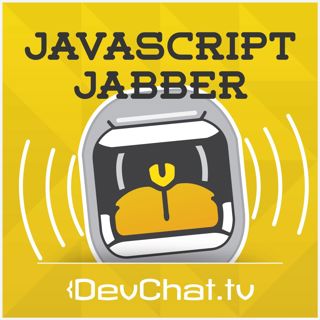
Adapting to Effect Cluster: JavaScript Developers' Guide to Enhancing Code Maintainability - JSJ 639
In today's episode, they dive deep into the world of JavaScript and TypeScript. They explore the innovative message-passing style between components using Effect Cluster, a game-changing alpha product that integrates seamlessly with solutions like Remix and React Server Components.Join them as Michael sheds light on the ease of transitioning TypeScript developers familiar with frameworks like React and Svelte to Effect, thanks to JavaScript’s component-based mindset and features similar to async/await. They also talk about the role of TypeScript and Effect in ensuring code maintainability and correctness amidst legacy JavaScript at Sisense.As they navigate through topics like performance optimization, multithreading in JavaScript, and backend development, discover how the Effect framework simplifies testing, enhances type inference, and boosts code stability. Plus, they touch on coding challenges, error handling, and the importance of proper monitoring with tools like OpenTelemetry.But it's not all code! They share fun anecdotes from personal experiences with go karting, discuss the NBA draft, and even delve into some light-hearted humor with dad jokes and comedic analogies. This episode is packed with insights, laughter, and invaluable advice for developers and tech enthusiasts alike.Tune in now for a comprehensive discussion filled with expert knowledge, practical tips, and community insights, exclusively on Top End Devs!SocialsLinkedIn: Michael Arnaldi Twitter: @MichaelArnaldiPicksAJ - MSF Basic Rider CourseAJ - Alpine MotoSafe Wind Noise Ear PlugsDan - Pillar of Fire | Episode 1Dan - Pillar of Fire | Episode 2Become a supporter of this podcast: https://www.spreaker.com/podcast/javascript-jabber--6102064/support.
9 Heinä 20241h 35min

Building and Distributing PWAs: Tools, Techniques, and Insights - JSJ 638
In today's episode, they delve into the fascinating world of mobile web development with our esteemed guest, Maximiliano Firtman, a seasoned web developer from Buenos Aires, Argentina, who has over two decades of experience.Join them as Maximiliano takes you on a journey through the evolution of web and mobile development, starting from the early days of pure HTML and classic ASP, progressing through the milestones of Perl, PHP, and eventually into the realm of mobile technologies. He provides an insightful look at how mobile development has transitioned from early platforms like WML and BlackBerry to the modern era of Progressive Web Apps (PWAs).Together with Steve, they unpack the benefits and challenges of bringing the open web into the mobile space, discuss the impact of mobile performance on user experience, and explore various tools and best practices for developing efficient, fast-loading PWAs. From understanding the role of service workers and web manifests to exploring innovative APIs and caching methods, this episode is packed with invaluable knowledge for any developer aiming to enhance their mobile web development skills.Whether you're interested in optimizing web performance, getting hands-on with PWAs, or curious about the future of mobile app distribution, this episode has something for everyone. Tune in now to uncover actionable insights and expert advice on staying ahead in the ever-evolving landscape of mobile web development.SocialsLinkedIn: Maximiliano FirtmanFirt.DevPicksMaximilliano - llama-cliSteve - The ClubBecome a supporter of this podcast: https://www.spreaker.com/podcast/javascript-jabber--6102064/support.
2 Heinä 202437min

High-Performance Networking: Key Resources and Tools for Web Developers - JSJ 637
Robin Marx is a Web Protocol and Performance Expert at Akamai. They dive deep into the fascinating world of networking performance, where experts share invaluable resources and insights to optimize your web development projects. The speakers recommend essential tools and books like "High-Performance Browser Networking" by Ilya Grigorik and Barry Pollard's work on HTTP 2, and they dissect the nuances of modern web protocols such as HTTP 2 and HTTP 3. Special guest Robin Marx joins us to unveil the complexities of networking, emphasizing the importance of understanding how your server and browser interact to maximize efficiency.But it's not all technical; they also share some lighter moments. Discover TV shows like Netflix’s "Eric" and "Criminal Minds Evolutions," explore engaging articles from Big Think, and indulge in some geeky humor with a segment of dad jokes. Whether you're tuning in for professional insight or just some good old tech banter, this episode has something for everyone.SocialsLinkedIn: Robin MarxPicksCharles - Skyjo | Board GameCharles - Criminal MindsDan - Watch Eric | Netflix Official SiteRobin - We Are Legion (We Are Bob)Robin - HadesSteve - Is the Universe Finite or Infinite?Become a supporter of this podcast: https://www.spreaker.com/podcast/javascript-jabber--6102064/support.
25 Kesä 20241h 22min

Transforming React Development: The Experimental Compiler’s Approach to Memoization and Performance - JSJ 636
In this episode, they dive deep into the latest advancements in React with a special focus on the experimental React Compiler. Our guest speakers, Sathya Gunasekaran and Joe Savona, share their insights on how this cutting-edge tool aims to enhance performance and streamline development without disrupting existing code. They explore the goals of the React Compiler, including auto memoization, linting, and runtime optimizations, and how it plans to minimize unnecessary DOM updates. This is an in-depth discussion on subjects like referential equality, the complexities of memoization, API improvements for useEffect, and the compelling debate about whether React should introduce signals as a TC39 standard. Additionally, they discuss the potential transition for existing projects, the importance of community feedback, and the intriguing differences between React’s approach to UI as a function of state versus the signal-based model.Stay tuned to learn about the future of React, the practical benefits of the new compiler, and the ongoing experiments that could shape how we write and optimize JavaScript with React.SocialsLinkedn: Sathya GunasekaranPicksAJ - webinstall.devDan - Godzilla Minus One (2023)Become a supporter of this podcast: https://www.spreaker.com/podcast/javascript-jabber--6102064/support.
18 Kesä 20241h 29min

Practical Strategies for Web Optimization: Using Chrome DevTools - JSJ 635
Jack Franklin is a Senior Software Engineer at Google. They dive deep into the world of performance optimization. They explore the sophisticated capabilities of Chrome DevTools, focusing on the performance and insights panels. Jack shares invaluable tips on utilizing tools like Lighthouse and the flame chart to prioritize and analyze web performance, along with practical advice for maintaining a clean environment for accurate profiling.Join them as tehy decode the intricacies of debugging, from handling long tasks and layout thrashing to understanding the context of flame charts and network requests. Plus, they discuss the collaboration efforts between Chrome and Microsoft Edge, valuable educational resources, and even touch on topics like involvement in local politics and upcoming movie releases. Whether you're a seasoned developer or a tech enthusiast, this episode is packed with knowledge, humor, and practical advice to help you master web performance optimization. Tune in now!SocialsLinkedIn: Jack FranklinPicksCharles - Legendary: A Marvel Deck Building Game – SHIELD (2019)Dan - Dan Shappir: How to Maximize Web PerformanceJack - Sky Team | Board GameBecome a supporter of this podcast: https://www.spreaker.com/podcast/javascript-jabber--6102064/support.
11 Kesä 20241h 24min

New Frontiers in Web Platform Development with Bruce Lawson - JSJ
In this episode, they dive into the world of web development, featuring insightful discussions on the differences and costs associated with hiring React Native developers, the importance of understanding web standards and browser differences, and the ongoing efforts of the Open Web Advocacy organization. They share their experiences, concerns, and insights on Apple's impact on the open web, the EU's investigation into Apple's actions, and the implications of progressive web apps in light of Apple's policies. Join them as they unravel the complexities and controversies shaping the web development landscape, and explore the future of web app accessibility and competition across devices.SocialsLinkedIn: Bruce LawsonBruce LawsonPicksCharles - Harry Potter: Death Eaters Rising Charles - Vite | Next Generation Frontend ToolingDan - Barry Pollard | Google IODan - React Compiler: In-Depth Beyond React Conf 2024Become a supporter of this podcast: https://www.spreaker.com/podcast/javascript-jabber--6102064/support.
4 Kesä 20241h 19min

Building a Custom Front-end Framework - JSJ 633
Zach Lankton is the Product Engineer at Signature Payments. They dive deep into the world of software development and tech innovations. In this episode, they explore a wide range of topics, the main focus is on ReZact, a cutting-edge front-end framework discussed by Zach, which shares similarities with React and Svelte. The conversation covers the framework's unique features, the challenges of customizing form inputs in the browser, and the value of leveraging native browser capabilities. Additionally, they delve into the concept of signals as a means of state management, the technical implementation of signals, and their benefits compared to other state management tools. And that's just scratching the surface! So, get ready to enrich your knowledge and dive into the latest trends in software development with this insightful discussion.SocialsLinkedIn: Zach L. PicksAJ - The Andromeda StrainZach - A Man in Full | Netflix Become a supporter of this podcast: https://www.spreaker.com/podcast/javascript-jabber--6102064/support.
28 Touko 20241h 21min

Sentry's Impact on Web Vitals Understanding - JSJ 632
Lazar Nikolov is a Full-stack engineer. They engage in a deep exploration of diverse subjects, from historical veracity and book recommendations to crucial insights on web performance monitoring tools. Join the esteemed panelists as they navigate the complexities of understanding historical events, reflect on significant global issues such as Holocaust Memorial Day and ongoing conflicts, and delve into the intricacies of improving website performance with cutting-edge tools like Sentry. Stay tuned for an insightful and thought-provoking discussion that combines expert analysis with real-world applications in the realm of development and technology.Sponsors"Testim, who makes an end to end testing tool"Chuck's Resume TemplateDeveloper Book ClubBecome a Top 1% Dev with a Top End Devs MembershipSocialsLinkedIn: Lazar NikolovGitHub: nikolovlazarBecome a supporter of this podcast: https://www.spreaker.com/podcast/javascript-jabber--6102064/support.
21 Touko 20241h 25min






















